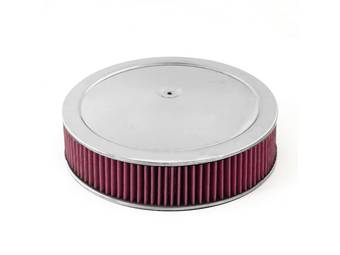Free Shipping on Orders Over $100
Subaru Ascent Cold Air Intakes
Only display items that ship the quickest
What Do Cold Air Intakes Do?
Cold air intakes—or any performance intake for that matter—are popular performance upgrades that operate on the notion that more airflow = more power. Cold air intakes improve your vehicle’s performance in numerous ways, including increased throttle response, fuel efficiency, and dyno-proven horsepower/torque gains. Performance aside, these accessories also provide a deep, sporty growl from under the hood. But how do they work?
Most factory intake systems are restrictive, consisting of inefficient paper filters and small-diameter baffled intake tubing. Cold air intakes address these shortcomings, employing high-flow conical air filters, smooth, large-diameter intake tubes, and air scoops that funnel cool exterior air into the engine bay—the more airflow, the more efficient combustion, which, in turn, boosts performance.
How to Choose an Aftermarket Air Intake System
So which air intake best suits your application? Your decision should factor in a few different variables, including:
Legality
While most intake systems come with a C.A.R.B. sticker, signaling the product’s compliance with the California Air Resources Board, others may not. Knowing your local rules and regulations, especially if you live in California, is essential to ensuring your vehicle remains smog-legal.
Design
Some intakes feature more efficient designs than others. For this reason, we always recommend choosing a product that’s undergone thorough R&D testing and demonstrates dyno-proven gains. After all, what’s the point of an aftermarket cold air intake if you don't gain any performance?
Air Filter Types
Performance air filters come in multiple media types, including dry-synthetic, oiled-synthetic, oiled-cotton, and disposable paper. Depending on your preference between disposal or cleaning and your climate, one style of filter may suit your needs better than another. Here’s a breakdown of the different air filter types:
Single-Use Paper
Conventional automotive air filters are manufactured from single-use paper media, offering solid filtration and airflow. These filters function well on unmodified applications, especially in dusty climates. However, better options exist for performance applications.
Oiled Cotton/Synthetic
Oiled filters are extremely popular in the automotive performance industry. These filters utilize a woven cotton or synthetic filter media coated in a light layer of specialized oil, which helps to capture contaminants while retaining the media’s high-flow characteristics. In most cases, oiled filters are also reusable, requiring only cleanings at the manufacturer’s service intervals rather than replacements.
Dry Synthetic
Lastly, we have dry synthetic filters. These filters feature woven synthetic media like an oiled filter, though they don’t require oiling to retain paper-like levels of filtration. These filters are the best of both worlds, offering exceptional filtering and airflow without requiring replacements or oiling.
Air Intake Components
Your air intake is a system that consists of several parts. When combined, these components efficiently channel air into your vehicle’s intake.
Air Filter
The air filter serves an essential purpose in a cold air intake system. While driving, dirt, debris, and contaminants constantly circulate in the engine bay. If these contaminants find a way into your vehicle’s intake, they can cause irreparable damage to the engine’s internals. Air filters prevent contaminants from entering the intake tract, ensuring the engine inhales only clean, filtered air.
Intake Box
The air intake box houses the air filter, keeping engine bay contaminants from dirtying the filter media and insulating the filter against underhood heat. Some aftermarket intakes don’t feature fully enclosed boxes, which is where products like aFe Cold Air Intake Covers come in handy.
Intake Scoop
The air intake scoop forms a direct pathway between your vehicle’s exterior and the airbox, allowing the engine to inhale cool, dense, fresh air. While factory intake scoops traditionally suffice for stock power levels, performance intake scoops, like the Banks Super-Scoop, offer increased airflow directly to the air filter.
Intake Tubing
Your vehicle’s intake tubing transfers clean air from the intake box to the throttle body/intake manifold. Stock intake tubes are traditionally restrictive, whereas aftermarket options, like the Banks Power Elbow, promote smooth airflow into your vehicle turbocharger or intake manifold.

